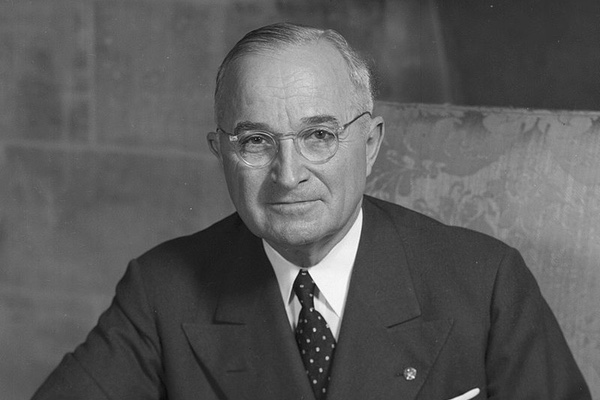The Man Who Made the Modern World: Harry Truman

Many US politicians, foreign policy analysts, and a few historians, feel that the world is moving precipitously close to a second Cold War, with Russia again as “the enemy.” It may be a glib view, tinged with nostalgia since the real Cold War was the last war that “the West” can plausibly claim to have won. The comparison offers a rare opportunity to reconsider the American leader who took the country into what many commenters are calling Cold War One.
 America’s
overwhelming dominance as a superpower, economically and militarily,
dates from victory in 1945 - and it was Truman who decided that
wealth and muscle had to be used for global politics though many of
his opponents wanted a return to isolationist “fortress America”.
Truman is the only world leader who has ever ordered the use of
nuclear weapons, a decision with ramifications that the whole world
has had to live with for the last 70 years. It was Truman who decided
that America would be in the business of building nations, and he
realized it was a process that would take time, patience and
generosity of spirit, not just American weaponry.
America’s
overwhelming dominance as a superpower, economically and militarily,
dates from victory in 1945 - and it was Truman who decided that
wealth and muscle had to be used for global politics though many of
his opponents wanted a return to isolationist “fortress America”.
Truman is the only world leader who has ever ordered the use of
nuclear weapons, a decision with ramifications that the whole world
has had to live with for the last 70 years. It was Truman who decided
that America would be in the business of building nations, and he
realized it was a process that would take time, patience and
generosity of spirit, not just American weaponry.
Above all Truman instinctively sensed that the Soviet Union posed a challenge to “the West” in a way that imperial Japan and Nazi Germany did not. Victory in World War Two left the “third ally,” the USSR, in control of most of Eastern Europe. But it was not so much the occupation of Poland, Hungary or East Germany that was the danger, awful though it may have been for people in Budapest, Warsaw or Prague to live at the mercy of Stalin. Soviet-style Communism would mean profound change to a way of life that genuinely appealed as a Big Idea to millions of intelligent people.
It is hard to recall now, so thorough has been its defeat, but Communism was a real ideological threat to liberal democracy - particularly in postwar Europe, where there was mass starvation and chaos, the biggest refugee crisis the world had ever seen and no firm faith in free market capitalism that great numbers of people believed had brought the Depression which led to fascism, Hitler and catastrophic war. In Asia, Communism offered hope to vast masses of people who thought that the war for “freedom” ought perhaps to have meant an end to colonial domination by the old European powers. Harry Truman was not a highly educated man but he could see why Communism was the challenge. And he knew that in the last years of Stalin’s life (the Soviet dictator outlasted Truman in office by six weeks) it was never going to be possible to do deals with him that would stick.
The Cold War began almost as soon as the hot war ended. One of the main trigger points, in one of those elegant ironies of history, was a crisis in Iran, and one of the crucial dates was 2 January 1946. The Soviets and the British had jointly occupied Iran during the war but both promised to leave within four months of the conflict’s end. The British withdrew as agreed; the Russians clung on to a small enclave in the Azerbaijan region in the north of the country, which bordered the USSR. After months of negotiating with Soviet leaders, exasperated and frustrated, Truman wrote to his Secretary of State. “The presence now of Soviet troops in Iran is an outrage if ever I saw one,” he said. “ Unless Russia is faced with an iron fist and strong language another war is in the making…. I am tired of babying the Soviets.”
The “babying” remark may have been more of an instinct than a policy. But a range of new Truman era policies followed, which essentially formed America’s front in the Cold War. It was “containment” of the USSR, ideologically and militarily, that brought down the Soviet Empire 40 years later. Though Truman’s predecessor Franklin Roosevelt told his Chiefs of Staff, and British Prime Minister Winston Churchill that American troops would stay in Europe no more than two years, in fact they would stay for decades. Truman created the CIA and proceeded to invest heavily in intelligence. The Cold War spawned a culture all its own and encouraged new genres of art and literature. For many people today the Cold War IS the spy movie – even now: the latest Steven Spielberg blockbuster, Bridge of Spies, is a classic of the type.
The Cold War is Truman’s legacy. One positive result was the Marshall Plan, which ought to have been called the Truman Plan. (It was an uncharacteristically selfless gesture to let his Secretary of State get the credit - and along with it the Nobel Peace Prize). Huge injections of US dollars saved Western Europe from penury – and as the president saw it, from Communism – in an act as generous as it was smart. It is difficult to conceive of anything as broad thinking, imaginative – or indeed practical – in terms of peacemaking happening now. The downside was encouraging the “red scares” which led to the McCarthy era witch hunts that scarred America’s image as a tolerant democracy for a generation.
Truman’s importance and success was as a foreign policy president – odd considering he left America just once before entering the White House and then all he saw were the trenches in France as a soldier in World War One. He had no experience in foreign affairs until he became president . Even when Truman was vice president FDR wouldn’t let him into the “map room” (today’s situation room) during the war. He was shown no military secrets and didn’t know about the Manhattan Project to build the Atom Bomb until he entered the Oval Office. He was shown no correspondence between Roosevelt and other world leaders. He found clever and gifted people to work for him and he got big things right, which is not a bad epitaph for a politician.